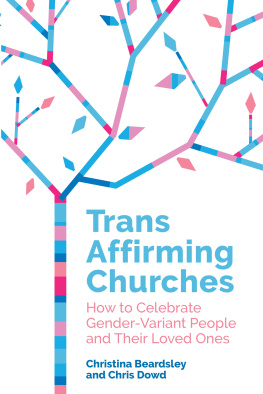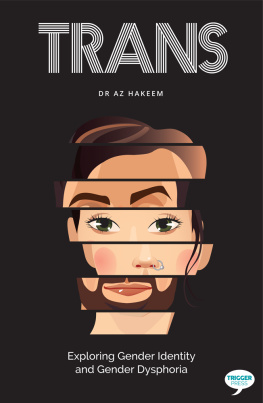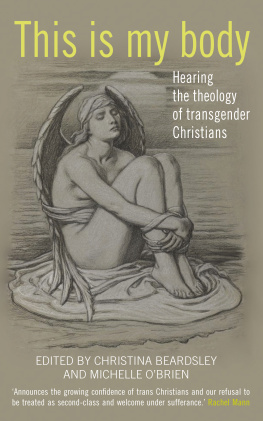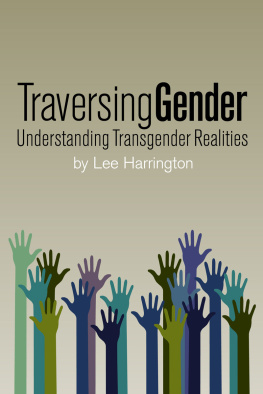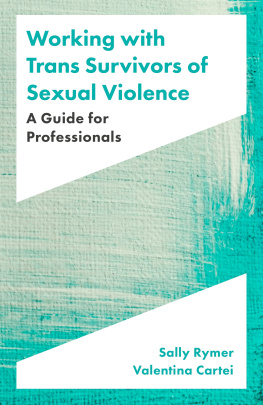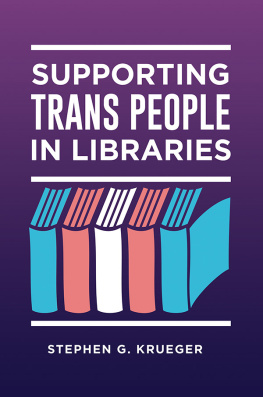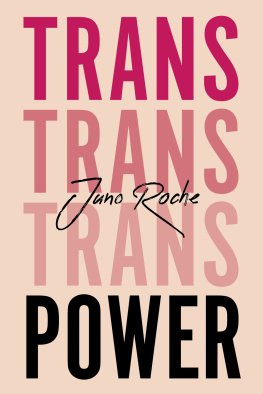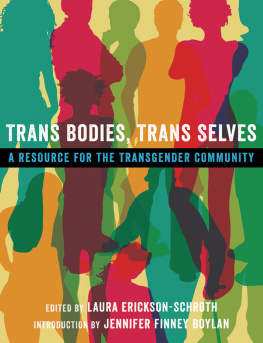Contents

Trans Affirming Churches
How to Celebrate
Gender-Variant People
and Their Loved Ones
CHRISTINA BEARDSLEY
and
CHRIS DOWD
Foreword by Dr Susannah Cornwall

As a mum you want to bring them in and wrap them up and you be the refuge, but surely there should be a church that is their refuge, surely, but there now I am sure there is [where she currently resides]. (Becky, mother of a transgender daughter)
What would help would be for people to stop being judgemental. This is the first and most important step and I would say that people claim not to be judgemental but with a carefulprodding they reveal their actual thoughts. (George, trans man)
My ideal minister is one that is probably much like the ones I have now that are willing to listen and talk to me about trans theology and how it helps me sort of discuss it so I dont go off on some giant heretical slant To be ableto be willing to publicly say that they are trans acceptingwilling to give trans people a voice where trans people dont have a voicewilling to use their position to advocate for trans inclusion. (Steve, trans man)
Contents
Foreword
This is a practical, accessible, user-friendly book, the fruit of the authors many years of experience working with trans people negotiating their relationships with religious institutions and communities of faith. As the title suggests, you have in your hands a no-nonsense how-to guide, both for churches already certain they want to fully nurture and support their trans members (and welcome new ones) and for those which are dipping a toe in the water and just want to learn more. I am delighted that it is appearing now, following a period of immense scrutiny of trans people both within the Church and in society more widely.
A lack of good-quality spiritual care for people exploring or undergoing gender transition, or who have transitioned some years before, continues to exacerbate the difficulties many gender-variant people face. In my own work, most recently the Modelling Transgender Spiritual Care project, funded by the Sir Halley Stewart Trust and conducted in partnership with the West of England NHS Specialist Gender Identity Clinic, it has become clear to me that at a time when gender healthcare services are under unprecedented pressure and waiting times are spiralling (with many people now waiting several years for initial appointments), communities of faith have an important role to play in supporting and upholding trans people and their families (Cornwall, forthcoming 2019). I am so pleased that Christina Beardsley and Chris Dowd have developed such a valuable resource which has potential to go a long way in making this happen.
Christina is a former trustee for trans people of Changing Attitude England, and a long-standing member of Sibyls, the Christian spirituality group for trans people, their families and supporters. She has written extensively on Christian responses to trans people, and I first became aware of her work when I read her incisive and devastating critique (2005) of the Church of Englands Archbishops Council 2003 document Some Issues in Human Sexuality . Christina, herself a Church of England priest, noted that the documents chapter on transgender discounted psychological and other scientific insights about trans identity, and anthropological insights about gender variance in other cultures; failed to draw on trans peoples own experience, including that of social and religious ostracisation; advocated misgendering people; and failed to interrogate its own use of the Bible. Christinas other previous work, like this new book, testifies to her deep commitment to facilitating trans inclusion in profoundly practical ways: it includes The Transsexual Person Is My Neighbour: Pastoral Guidelines for Christian Clergy, Pastors and Congregations (2007); This is My Body: Hearing the Theology of Transgender Christians (2016), a collection of writings by Sibyls members co-edited by Michelle OBrien; and, with Chris Dowd and Justin Tanis, Transfaith: A Transgender Pastoral Resource (2018).
Chris, a United Reformed Church minister, is a cisgender man whose work with trans people of faith has been motivated by a desire to create and promote better pastoral responses. His doctoral thesis from the University of Birmingham, which I had the privilege of examining, used participatory research and indigenous knowledge to engage in depth with trans peoples experiences of church membership and belonging, and the insights that their own self-understanding had allowed them with regard to theological and biblical accounts of gender and sex. It became the basis for the 2018 Transfaith book. Subsequently, in collaboration with Christina, Chris has run workshops for churches and other community groups on trans spirituality and inclusion, and he has spoken widely on trans and faith in the UK and Australia.
Christinas and Chriss experiences of ministry, both in congregations and chaplaincy settings and within support networks, have given them a depth of understanding of the hurt and bemusement often felt by trans people who have found churches less nurturing places than they had hoped. This book is a concrete, realistic, hands-on response. It rightly centres trans peoples own testimonies, but also sensitively addresses the difficulties faced by partners, parents and siblings of people who transition, who may grieve for the person they thought they had known, and experience insecurity, anger and resentment. It recognises that while some trans people feel deeply hurt when their churches cannot offer liturgies for transition, or mark other life events such as reaffirming their relationships, others prefer not to undergo any ceremonies of this kind, and that a one-size-fits-all response is likely to be unsatisfactory. It also acknowledges the discomfort experienced by some church members when someone in the congregation transitions.
With their characteristic good humour and unswerving commitment to love and justice, Christina and Chris reassure readers that even small, simple steps are beneficial, and that congregations need not take an all-or-nothing approach: Do not try everything at once. Do the things that make the most difference to being fair Take little steps to show the roof doesnt fall in when there is change.
Dr Susannah Cornwall
Senior Lecturer in Constructive Theologies, University of Exeter
Director, Exeter Centre for Ethics and Practical Theology (EXCEPT)
The Authors
Christina (Tina) Beardsley SMMS , is a Church of England priest and retired healthcare chaplain who assists in her local parish in West London. Educated at Sussex, Cambridge and Leeds universities, Tina speaks and writes about chaplaincy, spirituality, gender and Victorian religion, and is a Visiting Scholar at Sarum College. A member of the Sibyls, a Christian spirituality group for transgender people, Tina has advocated for trans inclusion in the Church through a number of organisations and is due to chaplain the Modern Church Annual Conference in July 2020 which will focus on identity, sexuality and gender.
Chris Dowd was originally a minister in the LGBT-identified Metropolitan Community Churches for over a decade, planting a queer-friendly fresh expression called Journey in the West Midlands. At the same time, he served as a special category minister for the United Reformed Church as a University Chaplain at Aston University. Chris retrained as a minister of Word and Sacrament within the United Reformed Church and currently serves several churches. Chris is also an Honorary Research Fellow of Queens College, Birmingham.

